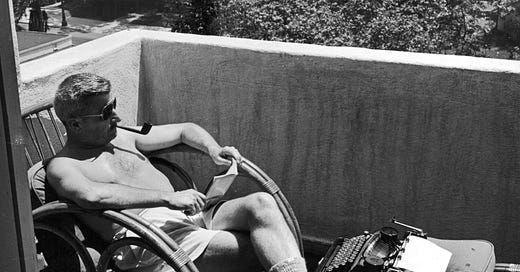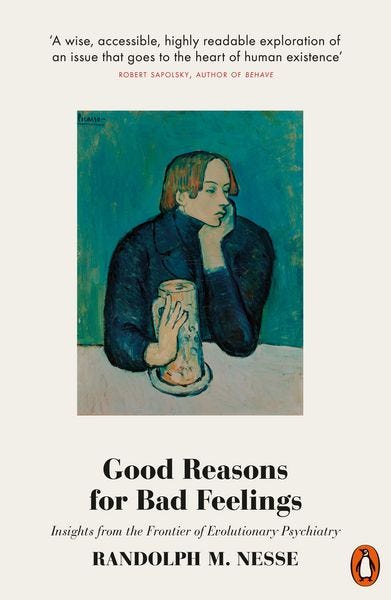TWH#41: Overcoming The Resistance
“I only write when inspiration strikes. Fortunately it strikes at 9:00 every morning.” —William Faulkner
Here’s one thing I learned about myself over the last few months: I procrastinate because I’m afraid what I’ll produce won’t be good enough. My imposter syndrome makes a great perfectionist out of me. When my prefrontal cortex says, “Hey! Time to write and you know it,” another part of my brain counters:
“Wait. More planning is needed. Play with the outline a bit. Or, better yet, don’t touch anything.”
“You’ll never reach the level in the vision you’re aspiring to. Why bother?”
“Did you notice that unread notification badge there? I wonder…”
Sounds familiar?
It gets worse. That shady part of my brain then whispers: “Look, if you never start, you can’t finish it. And if you don’t finish, you can’t fail. Think about that. Thank me later.”
And so I live to fight another day. While the stress piles up.
The Leader’s Hesitation
A similar pattern of hesitation was present in my previous life as a software engineering manager. In my first VP Engineering role, the team was clamoring for clarity on career progression. I promised them we would have a career ladder… and then procrastinated until their frustration was palpable.
Why? Because I wanted a really good career ladder that they really liked and that really solved the problem.
We finally created something which, of course, wasn’t that special and had a number of things that needed improvement. And the months I wasted procrastinating could have been spent doing what had to be done anyway—iterating on it based on the team’s feedback.
In my coaching practice, I witness this hesitation first hand in some of my clients. Especially those with a lot on their shoulders. Too much to do, too many concerns, too many options… “what should I focus on?” Unfortunately, the analysis paralysis, fueled by the fear of taking the wrong action (“What will others think?”) often leads to feelings of inadequacy, the good ol’ imposter syndrome.
Pause and Listen
Almost everything we feel is an opportunity to learn about ourselves. And there’s good reasons for bad feelings. These “bad” feelings are our body’s caring yet passive aggressive and clumsy way of telling us that something is off and needs to be examined.
To be able to listen and learn we need to slow down and be mindful. Only then can we ask ourselves the questions that truly matter:
“What is really making me hesitate here?”
“Why is that keeping me from getting started?”
“What would need to be true for the hesitation to go away?”
Today I recognize that my hesitation when it comes to writing, for example, has to do with the fear of failing. And that the fear of failing comes from a deeply embedded routine of feeling like I’m not enough.
The reason I don’t mind sharing this in public is because we all have some degree of such programming, and it doesn’t take away from our potential to do great things. To overcome it, however, we must uncover it first—whatever it might be. For that we need to give ourselves permission to pause, and to listen to what is trying to bubble to the surface.
Getting Past It
Whenever I “close my eyes and just start”, I always produce something that is good enough to keep going. Every. Single. Time. This very newsletter issue you’re reading is precisely a product of such push.
So, how can we create the conditions to just start? How can we feel the fear… and do it anyway?
Here’s a few things that can work:
Create a process… and then trust in it. Process is not just a procedure to follow. Instead, look at (and design) your processes as something to fall back on when motivation fails you. As sculptor Elizabeth King so eloquently put it: “Process saves us from the poverty of our intentions”.1
Or take it from American writer William Faulkner, portrayed at the top of this post: “I only write when inspiration strikes. Fortunately it strikes at 9:00 every morning.”Use the Procrastination Pomodoro. Another easy nudge to get started is to wrap the process in a mechanism that enable focus. The idea of the Pomodoro Technique is to resist any distraction for a mere 25 minutes—long enough to get something meaningful done, yet short enough to get you going.
My friend and fellow coach Josh Dietrich created an interesting enhancement to this: his phone goes into focus mode, all notifications turned off. And he proactively shifts his mood by putting on his AirPods and always cranking the same carefully curated—and ever growing—“Ambition” playlist.80% is good enough. I always found the Pareto Principle (aka “the 80/20 rule”) to be helpful. The idea is that 20% of the effort gets 80% of the results. And the reality is that more often than not, all things considered, those 80% are more than good enough. Reminding yourself of this fact on a daily basis goes some way towards breaking the mental habit of perfectionism.
Feed your own feedback loop. A lot of hesitation and procrastination comes from a lack of self-confidence. A cheap, but effective, way to increase your self-confidence is simply to reflect back on what you did well. Most of us take it for granted, while obsessing about what is not going well.
Ami Vora, Chief Product Officer at Faire, talks about reminding herself to feed her own feedback loop—to take time “for a small celebration after doing something hard so it’d be easier to keep doing difficult things every day”.Don’t seek to make the right decision. Make the decision right. Sun Microsystems co-founder Scott McNealy once said during a lecture about decision-making at Stanford: ‘It's important to make good decisions. But I spend much less time and energy worrying about "making the right decision" and much more time and energy ensuring that any decision I make turns out right.’2
The reality is that at the outset we can never know what the right decision is. So swiftly make the best decision you can and then focus the bulk of your time and energy on making that work—or pivot, if necessary.
Procrastinators might well be the leaders of tomorrow. Who knows. But today, the hesitation is not fun. And isn’t the reality that, a year from now, you will wish you had started today?
So, why not start… right now?
I learned about this quote from Seth Godin’s 2020 book The Practice, itself a great guide to building consistency.
Quoted by Ed Batista: https://www.edbatista.com/2012/01/the-right-decision.html






Joel Spolsky's Fire and Motion piece is still timeless. Sometimes I re-read it to remind myself that even the best of us have trouble "crushing it" all the time, and at times just getting *something* done in a day is a great start.
Great post Paulo! I am someone who identifies with hesitating before it's perfect. And your list of strategies resonates very strongly with me.
In particular, I've never heard Feed Your Own Feedback Loop stated that way but I completely agree. I recently started creating "callouts" in my journal to highlight when I did something great, accomplished something hard, or noticed that something I did was a source of positive energy (I did the same for negative sources of energy). Makes a great way to review these highlights at the end of the week.